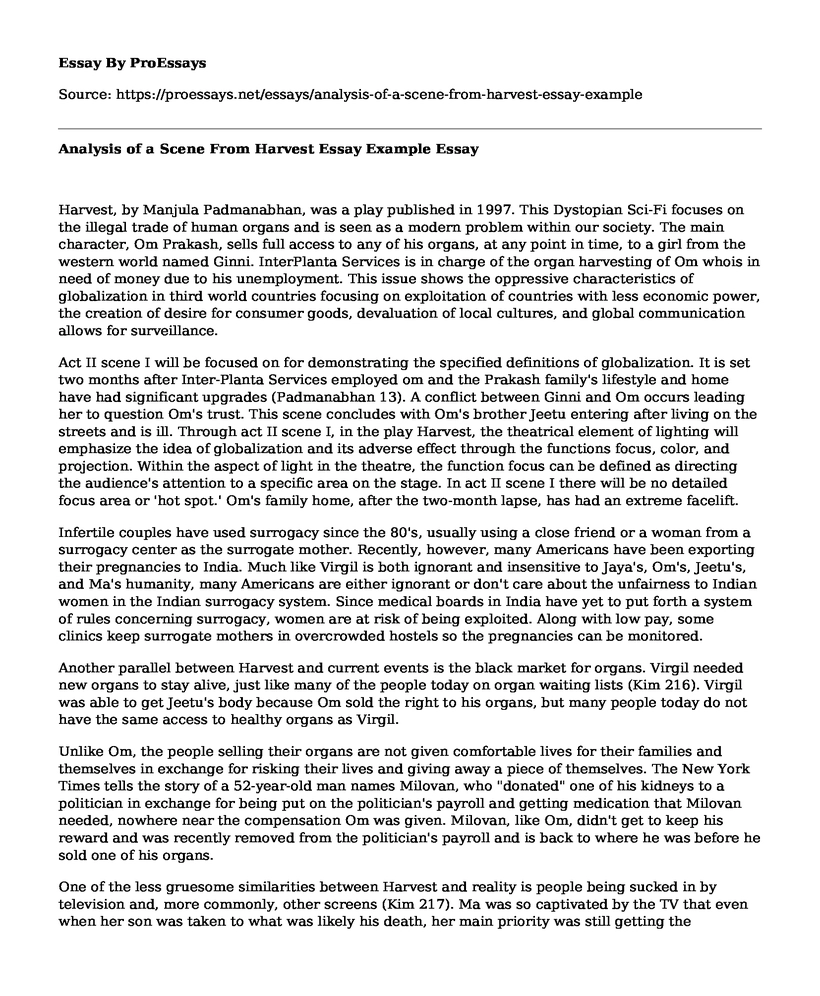Harvest, by Manjula Padmanabhan, was a play published in 1997. This Dystopian Sci-Fi focuses on the illegal trade of human organs and is seen as a modern problem within our society. The main character, Om Prakash, sells full access to any of his organs, at any point in time, to a girl from the western world named Ginni. InterPlanta Services is in charge of the organ harvesting of Om whois in need of money due to his unemployment. This issue shows the oppressive characteristics of globalization in third world countries focusing on exploitation of countries with less economic power, the creation of desire for consumer goods, devaluation of local cultures, and global communication allows for surveillance.
Act II scene I will be focused on for demonstrating the specified definitions of globalization. It is set two months after Inter-Planta Services employed om and the Prakash family's lifestyle and home have had significant upgrades (Padmanabhan 13). A conflict between Ginni and Om occurs leading her to question Om's trust. This scene concludes with Om's brother Jeetu entering after living on the streets and is ill. Through act II scene I, in the play Harvest, the theatrical element of lighting will emphasize the idea of globalization and its adverse effect through the functions focus, color, and projection. Within the aspect of light in the theatre, the function focus can be defined as directing the audience's attention to a specific area on the stage. In act II scene I there will be no detailed focus area or 'hot spot.' Om's family home, after the two-month lapse, has had an extreme facelift.
Infertile couples have used surrogacy since the 80's, usually using a close friend or a woman from a surrogacy center as the surrogate mother. Recently, however, many Americans have been exporting their pregnancies to India. Much like Virgil is both ignorant and insensitive to Jaya's, Om's, Jeetu's, and Ma's humanity, many Americans are either ignorant or don't care about the unfairness to Indian women in the Indian surrogacy system. Since medical boards in India have yet to put forth a system of rules concerning surrogacy, women are at risk of being exploited. Along with low pay, some clinics keep surrogate mothers in overcrowded hostels so the pregnancies can be monitored.
Another parallel between Harvest and current events is the black market for organs. Virgil needed new organs to stay alive, just like many of the people today on organ waiting lists (Kim 216). Virgil was able to get Jeetu's body because Om sold the right to his organs, but many people today do not have the same access to healthy organs as Virgil.
Unlike Om, the people selling their organs are not given comfortable lives for their families and themselves in exchange for risking their lives and giving away a piece of themselves. The New York Times tells the story of a 52-year-old man names Milovan, who "donated" one of his kidneys to a politician in exchange for being put on the politician's payroll and getting medication that Milovan needed, nowhere near the compensation Om was given. Milovan, like Om, didn't get to keep his reward and was recently removed from the politician's payroll and is back to where he was before he sold one of his organs.
One of the less gruesome similarities between Harvest and reality is people being sucked in by television and, more commonly, other screens (Kim 217). Ma was so captivated by the TV that even when her son was taken to what was likely his death, her main priority was still getting the television back on. Harvest as a dystopian play is pretty frightening, seeing as present-day life mirrors it so carefully in many ways. Between people selling their bodies regarding pregnancy or organ "donation," and allowing computers, TV, and cell phones to eating away at their lives, Harvest hits a little too close to home for comfort.
Works Cited
Kim, J. "Debt, the Precarious Grammar of Life, and Manjula Padmanabhan's Harvest." Womens Studies Quarterly. 42 (2014): 215-232.
Padmanabhan, Manjula. Harvest. New Delhi: Kali for Women, 1997. Print.
Cite this page
Analysis of a Scene From Harvest Essay Example. (2022, Aug 23). Retrieved from https://proessays.net/essays/analysis-of-a-scene-from-harvest-essay-example
If you are the original author of this essay and no longer wish to have it published on the ProEssays website, please click below to request its removal:
- I Know Why the Caged Bird Sings
- Life is About Perseverance - Creative Writing Example
- Is Billy Pilgrim Sane or Insane? - Paper Example
- Research Paper on Contextualizing the "Grapes of Wrath" Within the Epic of Great Depression and Dust Bowl
- An Analysis Essay on the Significance of Love and Loyalty in Sophocles' Antigone
- Essay Sample on Three Iconic Musicians Who Changed Society Through Music
- Essay Example on Dances With Wolves: A Journey of Love and Mutual Respect







